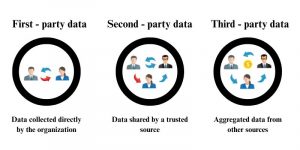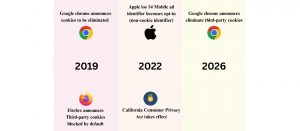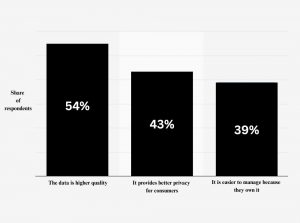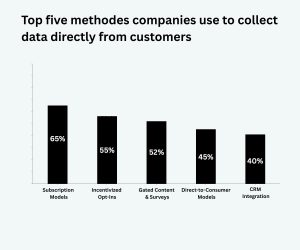Ever wonder how ads seem to know exactly what you’re thinking – and why that’s about to change?
For over two decades, third-party cookies have silently powered the world of online advertising, enabling brands to track users across websites and deliver hyper-targeted messages. But as digital privacy takes center stage, consumers are pushing back.
Global regulations like the General Data Protection Regulation (GDPR) and the California Consumer Privacy Act (CCPA) are redefining what ethical data usage looks like.
Now in 2025, we’re witnessing a monumental shift, marketers are abandoning reliance on third-party data and embracing first-party data strategies, not just to stay compliant, but to rebuild trust, deliver value, and keep advertising both effective and respectful.

2. The Fall of Third-Party Cookies
Major browsers such as Chrome, Firefox, and Safari have announced plans to phase out third-party cookies. This move responds to consumer pushback against invasive tracking and a demand for greater transparency. The deprecation of third-party cookies disrupts programmatic advertising, retargeting, and behavioral tracking, compelling marketers to seek alternative solutions.
The image below shows the timeline showcasing key milestones in the deprecation of third-party cookies across major platforms and regulations. Highlights include Apple Safari’s ITP updates, Google Chrome’s announcements, Firefox’s Enhanced Tracking Protection (ETP), and global regulations illustrating the global shift toward greater data privacy and user control.

3. What Is First-Party Data & Why It Matters in 2025
According to a Statista survey, 60% of global brands say they rely exclusively on first-party data because it offers higher quality, while 54% cite improved privacy for consumers as a key benefit. Additionally, 43% of respondents find it easier to manage because they own the data directly. These advantages make first-party data a more accurate, privacy-compliant, and trustworthy source for crafting tailored experiences.
The graph below illustrate the top reasons why brands are turning to first-party data for personalization, including data quality, consumer privacy, and ease of ownership.

4. Top Strategies for First-Party Data Collection in 2025
To effectively gather first-party data, brands are employing various strategies:
-
Incentivized Opt-Ins: Offering quizzes, loyalty programs, or personalized recommendations to encourage data sharing.
-
Subscription Models: Providing exclusive content or benefits in exchange for user information.
-
Gated Content & Surveys: Collecting data through access-controlled resources and feedback forms.
-
Direct-to-Consumer Models: Building direct relationships with customers to gather insights.
-
CRM Integration: Consolidating customer data for a unified view and personalized engagement.
The graph below highlights the rising popularity of engagement-driven tactics like subscription programs and content-based value exchanges as trusted and effective data collection strategies.

5. Real-World Brand Examples
Leading brands are successfully leveraging first-party data:
-
Apple
Emphasizes user privacy and utilizes first-party data to enhance user experience.
-
Amazon
Uses purchase history and browsing behavior to provide personalized recommendations.
-
Netflix
Analyzes viewing habits to tailor content suggestions.
-
McDonald’s
Implemented a first-party data strategy in Australia, resulting in a 92% revenue increase by utilizing data from their mobile app to enhance audience targeting.
6. Too Long to Read?
-
Third-party cookies are being phased out by major browsers due to privacy concerns, marking a major shift in digital advertising by 2025.
-
Regulations like GDPR and CCPA are pushing brands to adopt ethical, transparent data practices.
-
First-party data is collected directly from consumers, making it more accurate, compliant, and trusted.
-
Common collection strategies include loyalty programs, gated content, surveys, subscriptions, and CRM integration.
-
Incentivized opt-ins and content value exchanges are now key to earning user data in a privacy-first era.
-
In 2025, successful marketing hinges on building trust through transparent, value-driven data collection and usage.
Please Leave a Comment & Check out other similar blogs:
2025 Digital Marketing Trends: Predictive Marketing with AI – Anticipating Customer Needs
2025 Digital Marketing Trends: How AI Is Revolutionizing Customer Experience
2025 Digital Marketing Trends: How to Build Customer Journeys




Nice one, first-party data is definitely the future of trust-based advertising
Thank you Anja! I completely agree, first-party data is definitely paving the way for more authentic and trust-driven advertising. Which strategy do you think brands should prioritize first to boost their first-party data collection?
Thanks for asking! I think brands should start by focusing on building strong loyalty programs, it’s a great way to encourage customers to share their data willingly
I absolutely agree with you Anja! Loyalty programs are a smart and engaging way to build trust and collect valuable data directly from customers. Have you seen any brands doing this particularly well?
Intéressant Yazid, La transition des cookies vers les données first-party représente un tournant crucial pour le marketing digital
Je suis tout à fait d’accord avec toi André! Ce changement oblige les marques à repenser leur stratégie de collecte de données et à bâtir une relation plus directe avec les consommateurs. Penses-tu que cela renforcera la confiance des utilisateurs ou qu’ils resteront méfiants malgré tout?
Bonne question Yazid. Je pense que cela peut réellement renforcer la confiance, mais seulement si les marques jouent la carte de la transparence et si les utilisateurs comprennent pourquoi leurs données sont utilisées, ils seront alaise à partager.
Je te rejoins André, la transparence est essentielle et plus les marques seront claires sur l’usage des données, plus les utilisateurs seront enclins à les partager
Really interessting topic. I really liked the Netflix example, it’s a great way to show how first-party data works in practice. That’s why Netflix always pumps up films and series that interest me; it analyzes what I watch and makes suggestions that actually match my taste. Smart and user-friendly!
Thank u Llorian for your comment. It’s impressive how Netflix turned viewing habits into personalized recommendations that actually feel relevant. How do you think this level of personalization impacts user trust and privacy concerns?
I like it, I found the transition from cookies to first-party data really well explained. I’ve also personally experienced the Amazon example, those personalized recommendations based on my browsing and purchase history are spot on!
Thanks a lot! I’m glad the shift from cookies to first-party data was clearly explained, and it’s great to hear the Amazon example connected with your own experience—it’s a powerful demonstration of how data can enhance user engagement. How do you see this transition to first-party data affecting smaller businesses that don’t have the same data-gathering capabilities as giants like Amazon?
That’s a nice point, smaller businesses might not have amazon level data, but I think they can still benefit by focusing on quality over quantity, like gathering data through loyalty programs, email sign-ups, and direct customer interactions…
I totally agree with u, smaller businesses may not have massive data pools, but they do have the advantage of personal touch